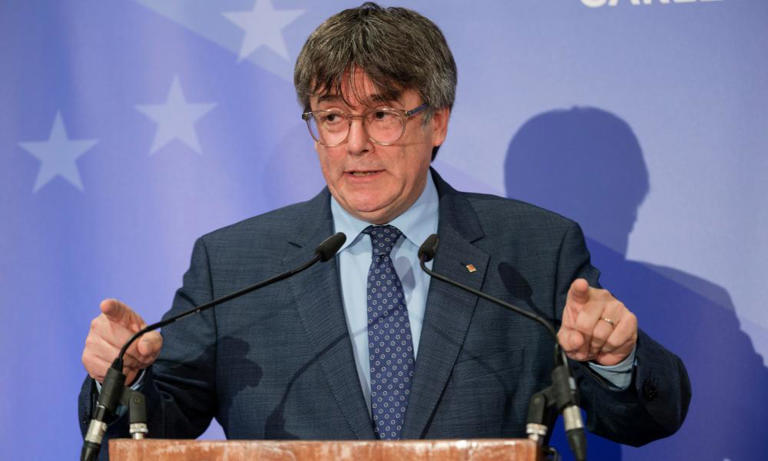Drop cases against Catalan separatists if you want our support, Puigdemont says
Story by Lisa O'Carroll in Brussels and Sam Jones in Madrid • The Guardian

The self-exiled former Catalan president Carles Puigdemont has called for the dropping of all judicial cases against himself and his fellow separatists as the price for securing his party’s support in forming a new Spanish government in the wake of July’s inconclusive general election.
Puigdemont, who is currently a member of the European parliament, has lived in Brussels for the past six years after fleeing Spain to avoid arrest over his role in the failed unilateral bid for regional independence in October 2017. While he is still sought by Spanish courts, he now also finds himself playing kingmaker as Spain’s acting prime minister, the Socialist leader Pedro Sánchez, attempts to garner support for a new coalition government.
The conservative People’s party (PP) won the largest number of seats in the election but Sánchez and his allies are far better placed to form a government – especially if they can win the backing of the seven MPs in Puigdemont’s centre-right Junts party. If neither the left nor the right bloc can put together a government, Spain will hold a repeat election in January.
Speaking in Brussels on Tuesday, the former regional president made clear that his party’s support for a new Sánchez administration would depend on “the complete abandonment of judicial proceedings” he and others face over the parts they played in the push to secede from Spain.
“This is what we want: that the Spanish government creates amnesty legislation,” he said. “This is the responsibility of our incoming government and our prosecutors.”
Related: Vote for Spanish Congress speaker boosts Sánchez’s premiership hopes
It followed a meeting in Brussels on Monday with Spain’s acting deputy prime minister, Yolanda Díaz, on negotiations about a new government. Puigdemont said on Tuesday that no talks would happen until three conditions – including the granting of an amnesty – were met.
“It should come as no surprise that we don’t have the right conditions for negotiations,” he said.
Puigdemont stopped short of calling for a new referendum but said a second condition of entering negotiations would be the recognition of the legitimacy of the 2017 referendum, which was suspended by Spain’s constitutional court and later ruled to have been unconstitutional.
His third demand was that what he called the “persecution” of all Catalans and their culture and language should end.
“We are talking about criminalisation of a culture,” he said, adding that if he were to form a pact with either of the two main parties he would need an official monitor to ensure the agreement was honoured in all aspects.
“Spain today faces a dilemma: call a second election and the risk and fragility is great, or you conclude an agreement with a deal with the party that will see the referendum of 1 October [2017] as legitimate,” he said.
But he added: “We are ready for elections, we are also ready for negotiations that could lead to a historic agreement.”
Puidgement has barely been seen in Brussels since the July election in Spain but used the press conference as a party rally, inviting dozens of members of the Catalan parliament to Belgium for the event.
The party faithful – who took up the front four rows usually allocated to press at such events – greeted him with a standing ovation and with similar applause after he ended his near 30-minute-long statement.
His home region, however, is decidedly split on the independence issue. According to a recent survey from the Catalan government’s Centre for Opinion Studies, 52% of Catalans want to remain part of Spain, while 42% favour independence. At the height of the crisis in October 2017, 48.7% of Catalans supported independence, while 43.6% did not. The stalled independence movement is also deeply divided: almost a year ago, Junts walked out of its regional coalition government with the more moderate Catalan Republican Left party.
Puigdemont’s demands are seen as an opening gambit in negotiations that could take months. His calls met with a measured response from the acting government.
“Our positions are diametrically opposed,” said its spokesperson, Isabel Rodríguez. “We have a tool for dealing with this situation, which is dialogue. And we have a framework, which is the constitution. We also have an aim, which is coexistence.”
The PP leader, Alberto Núñez Feijóo, will attempt to win congress’s support to be sworn in as Spain’s next prime minister on 27 September, but the parliamentary arithmetic is firmly against him.
Feijóo – who had sought to portray the PP as a party of the political centre ground before forging several regional and municipal alliances with the far-right Vox party – has attacked Sánchez for his dependence on Catalan pro-independence parties.
The PP leader described Díaz’s negotiations with a fugitive from Spanish justice as an “unprecedented democratic anomaly” and said they were an affront to the authority of the country’s courts and to the quality of its democracy.
“Who’s in charge?” Feijóo asked during an interview on the COPE radio station on Tuesday. “Puigdemont. Who’s going to decide who the next prime minister will be?”
No comments:
Post a Comment